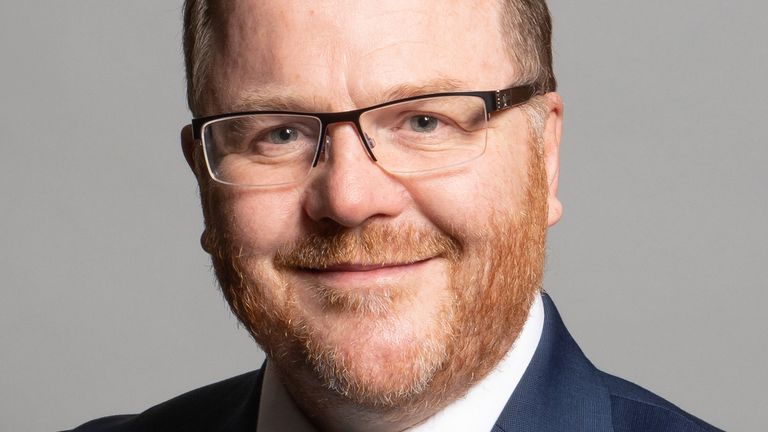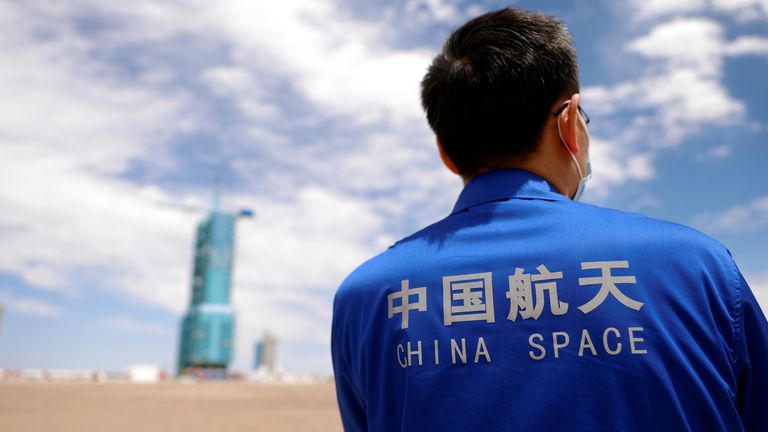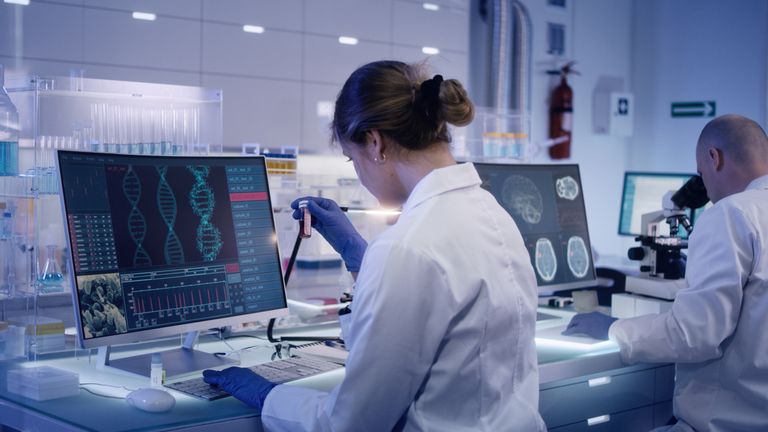The UK must become a “science superpower” where British-built rockets will launch British-built satellites running everything from cybersecurity to delivering pizza, the new science minister George Freeman has told Sky News.
Mr Freeman says he wants to put the days of Britain as a “science leader but innovation laggard” behind us, arguing UK consumers are ready to embrace new products like gene-edited meat that will improve animal welfare and tackle the climate crisis.
But could the squeeze on public finances as well as increasingly sour relations with the EU could stymie the ambitions of the former biomedical venture capitalist?
Today, Mr Freeman is announcing £440,000 of new funding from the UK Space Agency to research astronaut health. Understanding why and how the bones, muscles and eyesight of astronauts begin to deteriorate after just a few days in space.
It’s fundamental to sending astronauts on long missions to the Moon and Mars. Missions that the UK wants to be part of under its new National Space Strategy, launched last month.
The government has invested half a billion pounds into Britain’s space industry this year – part of the new National Space Strategy designed to help the £16bn sector compete with those in the US, China and Europe.
“The Americans are chucking huge money at this. The Chinese are chucking huge money at it. The Russians have got their own programme,” says Mr Freeman.
Investing in the UK space industry and collaborating with our allies like Europe, says the pro-remain MP and former trade envoy, will help increase our strategic influence worldwide.
“There are a lot of nations – Japan, Australia, the Philippines, who want to be secure in space, and don’t want to be vulnerable to Russia or the Chinese or bad actors.
“They want to be part of a network, a Commonwealth, if you like, of space scientists and businesses that are operating at the highest values. And I think that’s a big opportunity for the UK.”
Central to the National Space Strategy is boosting the UK’s ability to manufacture satellites but also launch them. But the minister wouldn’t confirm he’d hit the prime minister’s boast of launching the first satellite from UK soil as early as next year.
“I want to make sure that when we do it, that it’s an exemplar of what we’ve got here in the UK. It would be a shame, I think, to hit the target date and rely on overseas providers,” says Mr Freeman.
Whether he is go for launch could ultimately depend on how much money is left for his department in the comprehensive spending review later this month where health and social care, COVID recovery and net-zero are all high priorities.
The pitch to Chancellor Rishi Sunak is very much that the space sector could be one of Britain’s biggest wealth generators: “The argument I’ve made to the Treasury, is that this isn’t frittering money on some some sort of space play game,” says Mr Freeman.
Relations with the EU could further constrain funds for science.
Before Brexit, the bulk of research in the UK was funded via the EU and access to important collaborations like the Copernicus satellite programme dependent on EU membership.
Negotiations about how to remain part of these programmes are ongoing, but Mr Freeman admits they could be poisoned by worsening relations over fishing and Northern Ireland.
“If for any reason the EU play hardball and we’re not allowed to be part of those programmes, we will invest in making sure that those companies that have been very reliant on those programmes are not left out,” he says.
But many researchers worry that the cost of going it alone in science will be higher than collaborating with Europe and when funds are limited, science is often the first to lose out.
Mr Freeman wants to see the UK commercialise its biotechnology better too.
He said he sympathised with UK scientists who have pioneered gene-editing of crops only to see their ideas marketed abroad.
Gene editing, where discrete changes are made to an organism’s DNA rather than foreign genes being added using genetic modification, has the potential to improve the quality of food and the sustainability of agriculture, he says.
With proper food labelling he thinks consumers are ready for gene-edited products.
“I think when they can see that gene editing has the ability to help us develop a range of products that can dramatically improve the environment, dramatically improve animal welfare, dramatically reduce use of chemicals, I think the public will be all for it.
“It’s an incredibly exciting moment where British science is helping to tackle global challenges.”




